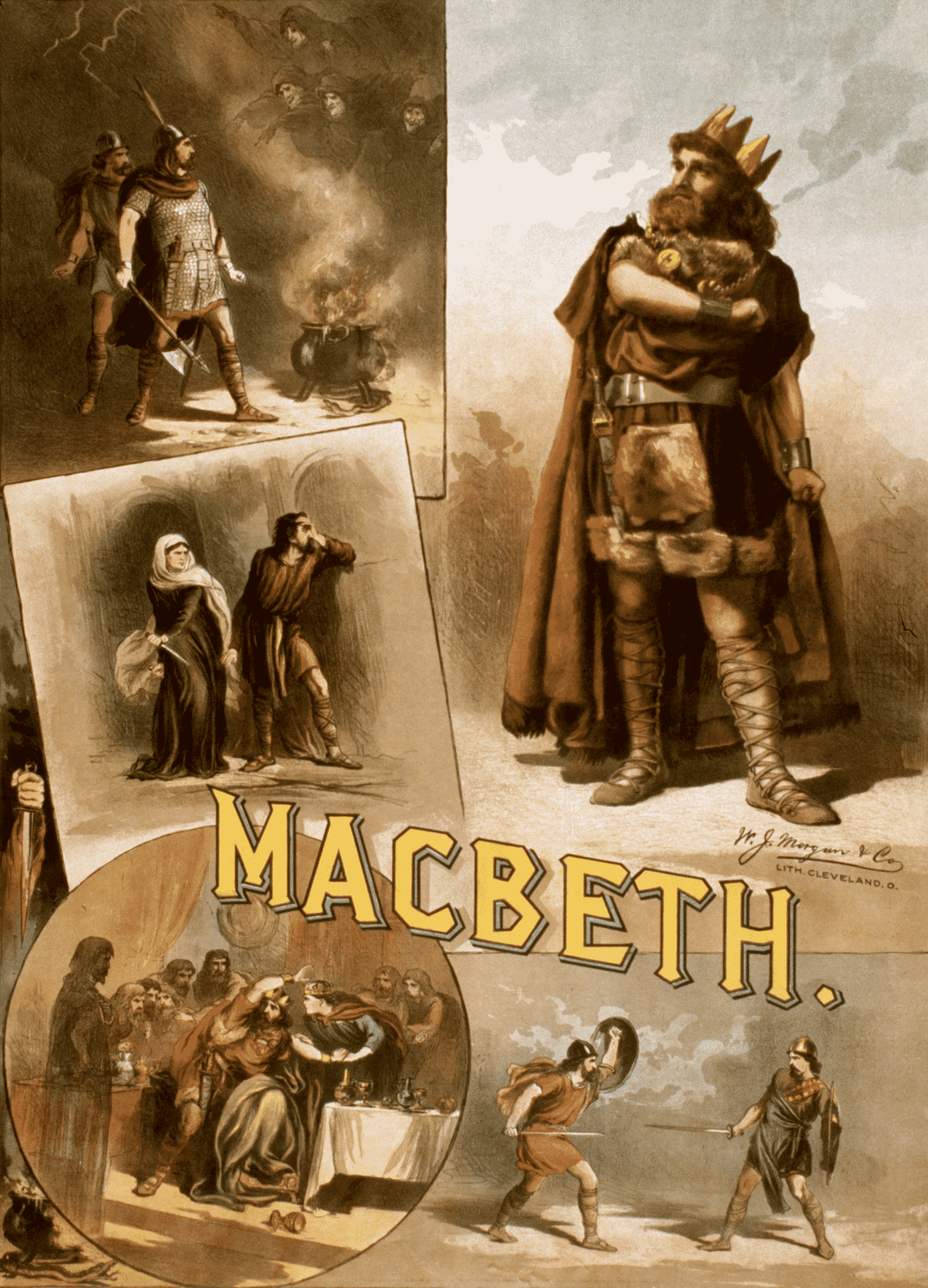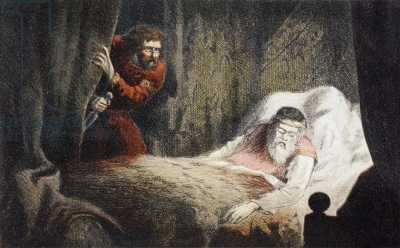As most Shakespearean tragedies, “Macbeth” is the story about a tragic hero whose desires bring about dismal self-destruction as well as recognition from the reader’s part. For the most part, “Macbeth” can be considered about  ambition and how power corrupts all, yet looking more in detail, the play is about heinous actions and the guilt that comes along with committing them. Through the journey of the protagonist Macbeth and his conflicting emotions, Shakespeare is able to advise against ambition and sacrificing one’s values in order to fulfill it.
ambition and how power corrupts all, yet looking more in detail, the play is about heinous actions and the guilt that comes along with committing them. Through the journey of the protagonist Macbeth and his conflicting emotions, Shakespeare is able to advise against ambition and sacrificing one’s values in order to fulfill it.
Unlike other Shakespearean novels, “Macbeth” is the only novel set in Scotland around the 11th century. In this situation, Macbeth is a Scottish general who serves the king and his country nobly. In the first few scenes of the play it becomes evident that Macbeth is both the protagonist and the antagonist for the fact that he becomes an enemy to himself and to everyone around him. Macbeth can be characterized as an intrepid character whose only desire is to be king and to maintain power. Closest to him are Lady Macbeth, Banquo, and the three witches. For instance, Lady Macbeth is the wife to Macbeth and ultimately the one that pushes him to commit his unforgiveable actions in order to become king. In the play, she is portrayed as relentless in convincing Macbeth to do the wrong thing, she is both manipulative and deceiving to her husband. Similarly, the three witches are able to make use of Macbeth as well, almost controlling Macbeth through implications of power and forebodings. At this level, the only character not toxic to the protagonist is Banquo, although he too becomes in the way of Macbeth’s journey to power, and is so cut short of a role in the life of Macbeth.
At the commencement of the play, Macbeth is a nobleman who alongside his friend Banquo, has been able to obtain a victory for Scotland and his king, Duncan. At the same time Macbeth asserts his victory, the Thane of Cawdor is being executed for treason, opening up that spot per say. On the way back to the castle, Macbeth thinks nothing of a higher rank, however that changes after he and Banquo encounter the three witches. In this scene, the witches scream, “All hail, Macbeth! Hail to thee, Thane of Glamis…Cawdor…king hereafter!” (1.3.51-3). Although initially taken lightly, after Macbeth is appointed the position of Thane of Cawdor, Macbeth makes it his mission to make the rest of the “prophecy” come true as well. Coincidentally, King Duncan of Scotland arranges a feast at Macbeth’s house, in which Lady Macbeth sees the perfect opportunity to murder him. In questioning her husband’s masculinity, as seen when she says “When you durst do it, then you were a man; And to be more than what you were, you would be so much more the man”, she is able to coerce him into committing the action (1.7.56-8). Act two results in the murder of Duncan by Macbeth, and the start of his internal conflict with his wrongdoings. Left as suspects are only Duncan’s sons, Malcom and Donalbain, for they fled the scene as soon as they found out about their father. Only suspicious of Macbeth however is Banquo, for he believes that Macbeth finally played into the fantasy of becoming king.
As a result of Duncan’s death, Macbeth is finally declared king, after many tears are shed for the departed and the “accused” (innocent

Macbeth about to murder King Duncan, 1890 (colou litho) by Dudley, Robert (fl.1865-91); Private Collection; (add.info.: Macbeth by William Shakespeare (c.1564-1616); From The Illustrated Library Shakespeare, published London 1890;); Ken Welsh; English, out of copyright
bystanders) are slain, Macbeth believes that he is only one step away from securing his place on the throne. The only thing stopping him in this case is Banquo and his son, Fleance. At his order, three men are ordered to kill Banquo and his son, but only succeed in killing Banquo. Gnawing at his conscious again, Macbeth believes to have seen the spirit of Banquo sitting at his seat, however Lady Macbeth resolves it by telling him that he was just seeing things. After Fleance flees, and Banquo is pronounced dead, Macbeth is distraught and goes back to his “roots”, or in this case the witches that set the stage for his position as king at all. Upon meeting with the witches, the only conciliation they bring him is fake, they tell Macbeth that he must fear Macduff and that “…none of woman born shall harm Macbeth”, which he takes as a sign for being unvanquishable, because after all every man is born of woman (4.1.91-2).
Strangely enough, Macbeth’s destruction is brought by a man not born by woman, since Macduff (whom he was told to fear) was actually born by caesarean section. After having gone to the witches, Macbeth failed to realize that Malcom in his exile was raising an army to forcibly take the throne from him. In fact, after Macduff’s family is killed by orders of the new king, the problem is only further augmented and Macduff encourages Malcom to take back the throne. Needless to say, he does, and in a duel between Macbeth and Macduff, Macbeth realizes the truth about Macduff only right before being decapitated. The play ends in Malcolm becoming a righteous king and the readers reaching their catharsis with the winning battle of good over evil.
To summarize, the play is about the rising of a nobleman through murder and deception and his downfall in doing so. However, because it is Shakespeare it is much more complicated than that. In truth, “Macbeth” can be about the battle between good vs. evil, ambition vs. righteousness, and fate vs. free will. Throughout the play, Macbeth presents himself as evil and tyrannical, and even though it seemed unlikely for the good to prevail in the end it did. Similarly, Macbeth’s inner conflict demonstrates his inability to come to terms with the actions he made in order to gain the crown. Throughout the play, Macbeth’s hallucinations of a dagger and Banquo’s spirit are just manifestations of his guilt, no matter how hard Macbeth tries his conscious still manages to deteriorate causing his own downfall like all good tragic heroes. Furthermore, the theme of fate vs. free will presents itself through the characters of the witches. Although no implication is made that they conjured Macbeth’s rise to power, it is evident that Macbeth single handedly made the “prophecy” come true. Even though most would believe that it was fate, it was mostly free will that lead Macbeth’s life. Only he had the power to kill or not kill King Duncan and in doing so, he acted upon his own true desires and not upon request of someone else. In the play, there is also a strong distinction made between male and female, as portrayed by Shakespeare, it can be said that the woman is evil and inciteful. For instance, would Macbeth have killed King Duncan had he not met the three witches? Or upon his wife’s craving? In every situation, the woman becomes a burden to Macbeth or devises to put their interests before his, contrasting the different roles of gender in the play and Shakespeare’s respective attitude towards them.
In conclusion, “Macbeth” is the play concerning more than one thing. Shakespeare is able to touch on broad subjects through multiple characters and situations, something unattainable for many playwriters today. Still being able to capture the essence of a tragedy this is truly one of Shakespeare’s greatest works. Applicable to situations even today, ambition, morality, and fate are perpetual and interesting themes no matter the time period. Truly, for this, Shakespeare will continue to live on forever.
Bibliography
Shakespeare, William, Barbara A. Mowat, and Paul Werstine. The Tragedy of Macbeth. New York:Washington Square, 1992. Print.
